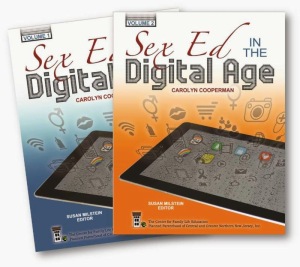 I am away this week, working with the United Nations Population Fund in Zimbabwe to create parent-child communication materials. I’ve posted a little bit about materials for or about parents here in the past, but this week it will be my focus.
I am away this week, working with the United Nations Population Fund in Zimbabwe to create parent-child communication materials. I’ve posted a little bit about materials for or about parents here in the past, but this week it will be my focus.
The lesson today comes from Sex Ed in the Digital Age. It’s an introduction to the idea of thinking about sexuality in digital spaces. Parents typically did not have the experience, as youth themselves, of being parented about sexuality and technology. While they may be familiar with technology in their own lives, figuring out how to translate that into the family and parenting context isn’t necessarily intuitive.
TECHNOLOGY AND TEENAGE SEXUALITY
A Lesson for Parents
by Carolyn Cooperman
Objectives
By the end of this lesson participants will be able to:
- Understand the interplay between developing sexuality and technological use.
- Make distinctions between harmful and beneficial technological practices.
- Conduct online searches that can be of support to parents in the digital age.
Rationale
Teenagers basically launch themselves into the digital age. They are curious, creative, adventurous, and sometimes daring as they experiment with the new technologies. The fascination with electronics occurs against the backdrop of accelerated sexual development. It therefore becomes logical and predictable that teens will bring their sex-related concerns into the technological arena. For their parents, adjusting to sexual development alone is sufficiently challenging. Now they must contend with the knowledge that what their children can search for online, who they contact, and what they transmit go far beyond the boundaries that existed in the past.
Parents are a motivated group—there is a lot at stake. This lesson tries to strike a balance between addressing the legitimate safety concerns that parents have about the new technologies, while offering an introduction into the types of technological resources that can actually benefit teenagers. Integrated throughout are opportunities for parents to consult with one another as they strive to define technological parameters in a rapidly changing world.
What I love about this lesson is that it introduces scenarios that are realistic and down to earth and invites parents to figure out how to respond to them. Without personal experiences and examples of how to consider these issues deliberately, parents often need support.
The lesson includes questions like:
- “Have any of you ever logged on to a sexual health website for teens? If so, what was your impression about the site and the information that was offered?” and
- “Which of the examples did you find challenging as a parent? Why?”
And so offers parents explicit guidance on how to learn more about the interactive world that adolescents inhabit and engages them in creative thinking about how to react.






